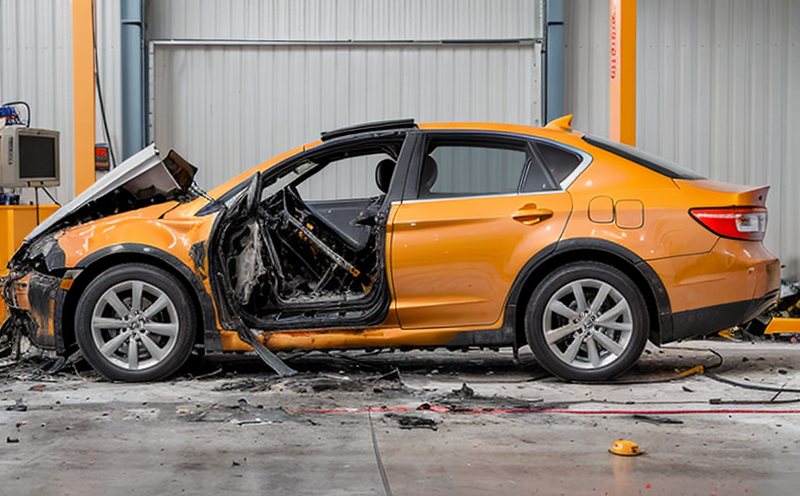BS EN 61960 Mechanical Abuse Testing of Secondary Lithium Cells
The British Standard (BS) and European Norm (EN) standard BS EN 61960 specifies the mechanical abuse tests to ensure the safety, reliability, and durability of secondary lithium cells. These batteries are widely used in portable electronic devices such as laptops, smartphones, power tools, and electric vehicles.
The standard covers a range of abusive conditions that might be encountered during use or transport, including mechanical impacts, vibration, heat exposure, and low temperatures. Compliance with this standard is crucial for manufacturers to ensure their products meet safety regulations set forth by various governing bodies worldwide.
At Eurolab, our state-of-the-art facilities provide comprehensive testing services aligned with BS EN 61960, ensuring clients receive accurate results that help them maintain compliance and enhance product quality. Our team of experienced engineers uses advanced equipment to simulate real-world scenarios, providing detailed reports that guide continuous improvement in design and manufacturing processes.
To begin with, secondary lithium cells undergo various abuse tests including drop testing from different heights onto hard surfaces like concrete or steel plates. This simulates potential impacts during handling or transportation. Additionally, compression tests are conducted using hydraulic presses to replicate situations where batteries might be squeezed between objects during packaging or storage.
Thermal abuse involves exposing the battery to extreme temperatures both above and below its operational range. Rapid temperature cycling is another critical test which replicates conditions found in harsh environments such as warehouses or vehicles parked under direct sunlight. Low-temperature tests ensure that even when exposed to freezing conditions, the batteries function safely without compromising performance.
Vibration testing mimics rough road surfaces or industrial machinery that could cause oscillatory movements during operation or transport. By subjecting batteries to controlled vibrations at specific frequencies and amplitudes, we assess their resistance against mechanical stresses induced by these motions.
Our laboratories comply with all relevant international standards including BS EN 61960 but extend beyond mere compliance to offer unparalleled insights into how your products perform under demanding conditions. With rigorous quality control measures in place, Eurolab guarantees accurate and reliable test results every time.
Eurolab Advantages
At Eurolab, we pride ourselves on offering world-class battery testing services that go beyond mere compliance with standards like BS EN 61960. Our cutting-edge facilities equipped with state-of-the-art instrumentation and software allow us to provide precise and repeatable results.
We have a team of highly qualified engineers who possess deep expertise in the field, ensuring accurate interpretation of test outcomes. This not only helps you meet regulatory requirements but also provides valuable information for improving product design and performance.
Our commitment to quality is reflected in our rigorous adherence to all relevant international standards including BS EN 61960. However, we do more than just conform; we strive to push the boundaries of what is possible within these guidelines, offering innovative solutions tailored specifically to your needs.
The comprehensive nature of Eurolab's services extends beyond simple testing into areas such as failure analysis and root cause identification. If issues arise during any phase of our testing process, rest assured that our team will work closely with you to determine the underlying causes and suggest appropriate corrective actions.
By choosing Eurolab for your mechanical abuse testing requirements related to secondary lithium cells, you gain access not just to a facility but also to a partner committed to excellence in every aspect of its operations. Whether it's ensuring compliance or driving innovation forward, we are here to support you every step of the way.
Environmental and Sustainability Contributions
Testing batteries for mechanical abuse according to BS EN 61960 aligns with broader goals of environmental protection and sustainability. By ensuring that secondary lithium cells withstand harsh conditions during their lifecycle, manufacturers can contribute significantly towards reducing waste and improving recyclability.
The standards set forth by this international norm promote the development of safer, more durable products which last longer before reaching end-of-life stages. Longer-lived batteries mean less frequent replacements, thereby minimizing the demand for raw materials extraction and processing.
Moreover, compliant testing helps reduce risks associated with improper disposal or accidental damage leading to hazardous material releases into the environment. Through adherence to these stringent guidelines, manufacturers play a crucial role in fostering sustainable practices across industries reliant on secondary lithium cells.
The methodologies employed by Eurolab align perfectly with these objectives. Our rigorous approach ensures that every product tested meets not only current regulatory standards but also future expectations regarding environmental responsibility. By incorporating sustainable practices into our testing protocols, we contribute to creating a cleaner environment while simultaneously supporting economic growth through efficient resource utilization.
Use Cases and Application Examples
The application of BS EN 61960 mechanical abuse tests is vast and covers numerous sectors where secondary lithium cells are used. Here are some specific use cases:
Laptops & Smartphones: These devices frequently experience drops, compression, and thermal exposure during everyday usage. Ensuring that the batteries inside these gadgets can withstand such conditions enhances user safety while preventing premature failure.
Power Tools: In industries like construction or manufacturing, power tools often face extreme mechanical stress due to heavy lifting or dropping incidents. Testing their batteries ensures they continue operating reliably even after being subjected to rigorous physical abuse.
Electric Vehicles (EVs): With increasing adoption of electric mobility solutions worldwide, EV manufacturers must ensure that their vehicles' batteries can handle rough terrains and varied weather conditions without compromising on performance or safety. Mechanical abuse testing plays a vital role in achieving this goal.
Aerospace & Defence: In these critical sectors, reliability is paramount. Aircraft and military equipment often encounter unpredictable environmental factors during operation. Ensuring that their batteries can endure such challenging situations is essential for maintaining mission readiness and crew safety.





